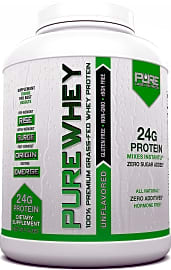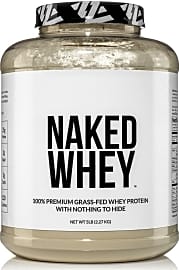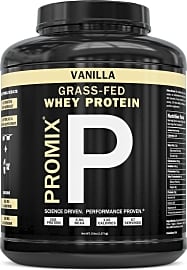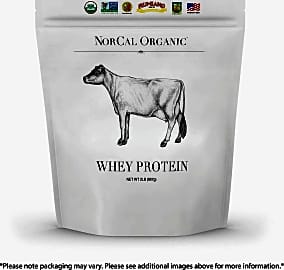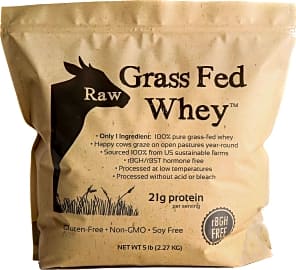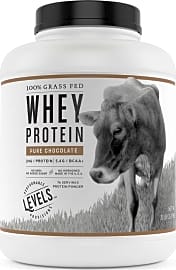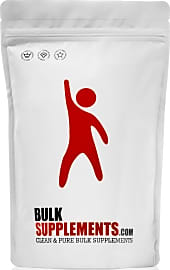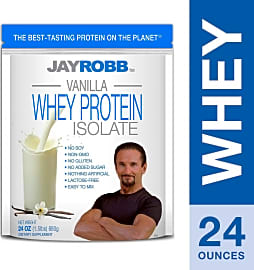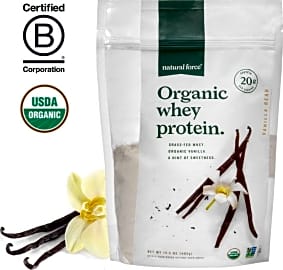The 10 Best Grass Fed Whey Protein

This wiki has been updated 38 times since it was first published in December of 2016. Considered a complete protein that's low in lactose and contains all nine essential amino acids, whey is commonly used to help improve muscle protein synthesis and promote the growth of lean tissue mass. If you're a fan, you might as well avoid any nasty additives while also promoting more ethical animal treatment by using grass-fed options, like the ones on this list. When users buy our independently chosen editorial selections, we may earn commissions to help fund the Wiki.
Editor's Notes
October 10, 2019:
This list includes some of the best grass-fed whey protein powders out there, and although taste is a highly subjective, personal matter, we opted for selections with a wide variety of palatable flavors and some with no taste at all to suit everyone's needs.
We prioritized items that contain no fillers and additives and boast thoughtfully-sourced ingredients so that users don't experience undue bloating, gas, or stomachaches. Additionally, we selected products that are formulated to mix easily, especially via natural means, like by using sunflower lecithin. All of the selections on this list should break down well in water or other beverages, but for the best results, use a blender.
For baking, Raw Organic Unflavored and Opportuniteas Isolate are top choices, while those who can't stand aggressive aftertastes or super thick consistencies will appreciate BulkSupplements Pure, which mixes extremely well with almost anything. Naked Nutrition's Undenatured is good for serious athletes who know how to balance their supplements with diet to increase bulk, while Pure Label Natural represents a no-frills choice at a fair price. We removed Bodylogix Natural in favor of our new choice, Opportuniteas Isolate, which we feel is far superior.
Special Honors
Transparent Labs 100% Grass-Fed Whey Protein Isolate Available in interesting flavors like salted caramel, mocha, and cinnamon pastry, as well as classic favorites like chocolate, French vanilla, and strawberry, this offering from Transparent Labs contains one of the industry’s highest protein-by-weight ratios at 88%, which translates to 28 grams of protein per 32 gram scoop. It's made from naturally fed, hormone-free cow whey and clean of artificial sweeteners, food dyes, gluten, and preservatives. transparentlabs.com
Is Grass-Fed Really Better?
After all, the most important thing is that you remember the whey to the gym.
You take fantastic care of your body, counting every calorie and reading the label on every jar of food. So, if your protein isn't top-of-the-line, you want to know ASAP.
But then again...grass-fed whey is expensive.
That's why you'd be forgiven to wonder whether the gains you'd see would justify the dent it'd put in your wallet. The fact of the matter, however, is that grass-fed whey might not just be better for you, but for the entire planet, as well (don't try to buy enough to feed the entire planet, though, that's not what we mean).
Regular whey comes from commercially-raised cattle, and their lives aren't great. Beyond being raised for slaughter or a lifetime of milking, they get fed a steady diet of grains, hormones, and antibiotics. This can affect the milk they produce (which is where whey powder comes from), going so far as to affect its nutrient profile.
One of the main differences is that most grass-fed cows eat diets that are higher in omega-3 fatty acids, conjugated linoleic acid, and vitamin E than their commercially-raised brethren, and they pass some of those nutrients on in the form of milk fat.
Now, it's far from proven that this affects the whey made from that fat at all. After all, when whey is processed, the protein gets separated from the fat, so any shortcomings should be cut out long before the powder gets to you. At the most basic level, regular whey should be identical to the grass-fed stuff.
If you're the type that doesn't want to take any chances, however, it may be worth springing for the grass-fed stuff just for peace of mind.
That being said, grass-fed cows have other advantages. There is some evidence that shows grass-fed cattle are better for the environment than the commercially-bred variety, although again, that's far from proven.
At the end of the day, your body will likely be fine regardless of what kind of whey powder you feed it. It's up to you to decide how much the other stuff matters.
After all, the most important thing is that you remember the whey to the gym.
How To Make Sure You're Getting Enough Protein
When you're constantly stuffing an endless number of grilled chicken breasts down your gullet, it can be quite demoralizing indeed to think that you still might not be getting enough protein.
The good news is that, if you're eating the bulk of your protein, then you're on the right track. It's certainly cheaper to get most of your nutrients from your diet, and may be better for you.
Of course, make sure your diet is well-balanced, and be sure to check with your doctor before you do anything crazy.
However, using supplements may well be easier. As you've likely already realized, trying to eat all the protein you need in order to add muscle is a chore, one that can make the mere mention of food enough to turn your stomach. When you factor in the time it takes to prep all that food, tossing a little powder in your blender starts to look more and more alluring.
Beyond downing shakes and cooking frequently, snacking is your best friend. Keep protein-heavy snacks, like cheese, nuts, and peanut butter handy, so that you're constantly fueling your body's muscle-building forge.
Be aware of the signs that you're not eating enough, as well. Increased soreness after exercise, being hungry after eating, and constant mood swings are all signs of a protein deficiency, so if any of those sound familiar, then be prepared to start eating more eggs and jerky.
To ensure that you get the most out of the protein you do eat, cook and chew your meats slowly. This makes them easier on your stomach, as well as helping your body break them down more thoroughly. A dash of something bitter is also smart, as that stimulates your digestive juices, so don't be afraid to squeeze some lemon juice on your salmon.
Of course, make sure your diet is well-balanced, and be sure to check with your doctor before you do anything crazy.
Now, isn't it about time you had another chicken breast?
How Does Your Body Use Protein, Anyway?
You know you need to eat a lot of protein to gain muscle — every meathead in the gym is constantly reminding you of that. But do you know why getting enough protein is so important for your body?
Your body uses proteins to build and repair its cells. Since lifting weights actually damages your muscles — prompting your body to make them bigger while rebuilding — getting plenty of protein gives your cells the construction materials they need to get the job done.
It takes longer to burn off protein, so it tends to provide longer-lasting energy than the short bursts you get from carbs.
There's a special amino acid in protein that improves the rate of muscle building, or anabolism, while also slowing down the muscle's destruction. This amino acid, leucine, is found in high levels in whey protein.
Protein is also your body's backup fuel source when there's not enough fat and carbohydrates to go around. It takes longer to burn off protein, so it tends to provide longer-lasting energy than the short bursts you get from carbs.
That's not to say that you can't get too much of this particular good thing. High-protein diets trigger a state called ketosis, which is where your body begins to burn fat instead of carbs for fuel. While this sounds good in theory (hence the diets), the breakdown of all that extra protein also produces lots of ammonia and calcium in your urine. No one knows for sure what ammonia will do to you long-term, but losing too much calcium can lead to osteoporosis.
The important thing is you get enough without overdoing it. Eating right and supplementing with shakes should do the trick — just be sure you're not neglecting all the other vitamins and minerals in the process.


